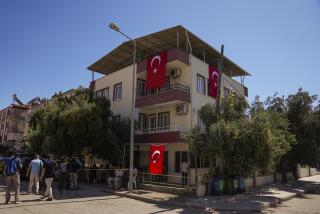Slaying in Turkey Raises Fears of Political Violence
- Share via
ISTANBUL, Turkey — ISTANBUL, Turkey -- Fears of resurgent political violence rocked Turkey on Thursday as police investigated the slaying of a prominent secularist academic in the capital, Ankara.
Necip Hablemitoglu, a 48-year-old historian at Ankara University, whose career was spent investigating the activities of Turkey’s shadowy Islamic brotherhoods, was fatally shot in the head outside his home late Wednesday, just days after receiving anonymous death threats.
Police described the killing as “highly professional,” saying assassins had left neither footprints nor fingerprints at the scene. There has been no claim of responsibility.
President Ahmet Necdet Sezer called the shooting an “obvious terrorist act” and a “politically motivated crime.”
“I hope this is not the beginning of bad days to come,” the pro-secular president said.
The mass-circulation daily newspaper Hurriyet speculated that the slaying might have been aimed at igniting fresh tensions between Islamists and secularists in this officially secular and predominantly Muslim nation. It could also have been a bid to weaken the ruling Islamic-rooted Justice and Development Party, which won power in Nov. 3 elections.
“Anytime that Turkey reaches stability there are those who want to destroy peace through terror,” Justice Minister Cemil Cicek said.
Hablemitoglu is the latest victim of a string of attacks against pro-secular public figures that shook Turkey throughout the 1990s. Among those targeted were Ahmet Taner Kislali, a former culture minister who was killed in a car bomb attack in 1999. Ugur Mumcu, one of the country’s best-known newspaper columnists and a fierce critic of radical Islam, was killed by a car bomb six years earlier.
Hablemitoglu first came to prominence over his claims that an influential and wealthy pro-Islamic fraternity, led by a fugitive Islamic cleric, had infiltrated key state institutions, including the rigidly pro-secular armed forces, with a secret agenda to introduce Islamic rule.
He claimed that the cleric, Fethullah Gulen, who is now living in the United States, had the backing of the CIA because of his moderate brand of Islam. Gulen seeks to promote that vision in former Soviet Central Asia, home to dozens of schools and universities set up and run by his brotherhood.
Meanwhile, tensions between Turkey’s military-backed pro-secular establishment and the government were poised to deepen after Sezer vetoed a constitutional amendment Thursday that would have allowed Justice and Development Party Chairman Recep Tayyip Erdogan to run for parliament in a by-election and eventually become prime minister. He was barred from running because of a conviction on charges of seeking to incite religious hatred by reading an Islamist poem at a rally.
More to Read
Sign up for Essential California
The most important California stories and recommendations in your inbox every morning.
You may occasionally receive promotional content from the Los Angeles Times.













